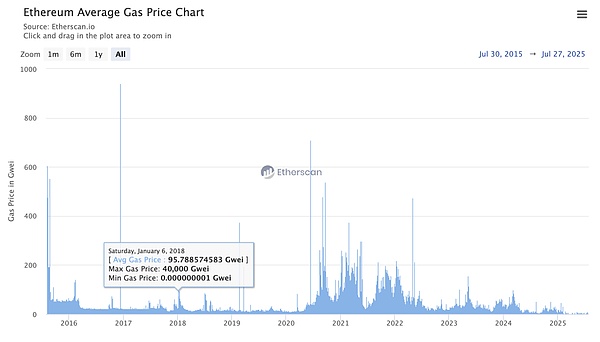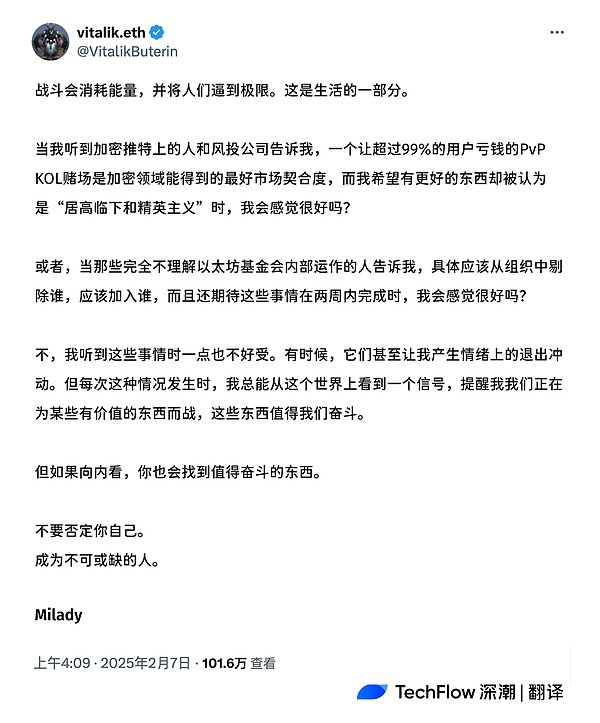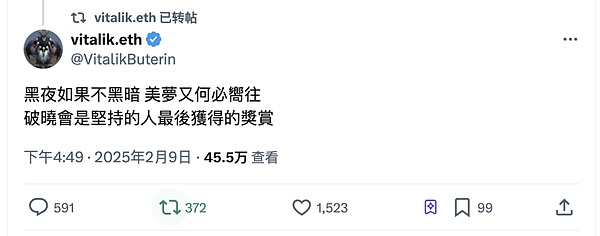Written by: Vitalik Institute
On July 30, 2015, the Ethereum mainnet launched.
Bitcoin grew spontaneously like a myth, depersonalized and unrewritten; Ethereum, like an unfinished play, the author never leaves the stage.
Vitalik Buterin, a technological idealist who rose to fame at a young age, has spent a decade continuously infusing his personal philosophy, values, and struggles into his code. From the initial vision of a "world computer" to the rethinking of governance amid the DAO crisis, from mergers to the profound transformation of the Foundation... every evolution of Ethereum bears the mark of Vitalik's thinking. Ethereum's ten years are also a history of Vitalik's intellectual evolution. A Genius's Utopia In 2008, a financial crisis brought an unprecedented storm. As banks collapsed and trust crumbled, Bitcoin emerged, sounding the clarion call of rebellion against the old ways. This emerging technology not only captivated geeks and cryptography enthusiasts, but also changed the life trajectory of one young man: Vitalik Buterin. Heroes have always emerged from youth. At an age when most people find love, 17-year-old Vitalik encountered Bitcoin. In 2011, he learned about Bitcoin from his father, a computer scientist. After giving up World of Warcraft, Bitcoin became Vitalik's new passion. He began searching Bitcoin forums online until he found someone who was willing to pay him for his articles in Bitcoin. At that time, he could earn 5 Bitcoins for each blog post he published. Vitalik's articles soon attracted the attention of Romanian Bitcoin enthusiast Mihai Alisie. The two began corresponding and co-founded Bitcoin Magazine in late 2011. In 2013, Vitalik used the Bitcoin he earned from his articles to travel around the world, visiting Bitcoin enthusiasts in Israel, London, San Francisco, Los Angeles, and other places. When he returned to Toronto, he was convinced that everyone had completely misunderstood Blockchain 2.0. This was because they were all trying to build complex applications on Bitcoin, but Bitcoin Script was too limited.
Vitalik realized that if he wrote a version of Bitcoin with a Turing-complete programming language, the network could provide all digital services, replicate social networks on the blockchain, reorganize the stock market, and even build completely digital companies, free from the jurisdiction of any government entity.
In November of the same year, 19-year-old Vitalik turned his idea into a white paper and gave it a name:
Ethereum. This white paper quickly swept the entire crypto community, and for the first time people realized that blockchain could be more than just a currency, but also a global decentralized platform. Co-founders such as Joseph Lubin and Gavin Wood joined in quick succession, with Lubin even calling him a "genius alien who brought the gift of decentralization." During that period, Vitalik was an extremely pure idealist. In an interview, he openly admitted that he held a dualistic worldview, believing that most social ills were due to centralized power. "I view anything involving government regulation or corporate control as pure evil." However, there is always a gap between idealism and reality. Disagreements first erupted within the team. Some co-founders wanted Ethereum to become a profitable commercial entity, while Vitalik preferred a non-profit, open community model. He even proposed reducing his and other co-founders' ownership stakes in Ethereum to avoid future concentration of power. The conflict reached a climax in June 2014. Vitalik asked Charles Hoskinson and Amir Chetrit to leave the team, and that same year, the Ethereum Foundation (EF) was established, establishing a non-profit governance direction. That same year, Gavin Wood also left due to disagreements with Vitalik over development priorities and the non-profit direction of the project. He then founded Polkadot in 2020. In an interview with TIME, Vitalik admitted that Ethereum’s vision for change was at risk of being overwhelmed by greed: “If we don’t make our voices heard, the only things that will be built are those that are immediately profitable, and those are often not what the world truly needs.” On July 30, 2015, dozens of young developers witnessed the automatic launch of the Ethereum mainnet in a small office in Berlin. There were no lavish celebrations, no large-scale media coverage, just a group of idealists quietly watching the blocks running on the screen. The vision of a "world computer" progressed from white paper to reality. However, behind the halo, young Vitalik wasn't prepared for the more complex and brutal realities of the world. Cracks in the Ideal In the early years of Ethereum, Vitalik was more of a pure technological utopian. He firmly believed that the ultimate meaning of blockchain lies in decentralization, emphasizing that anyone can freely build applications on Ethereum without the approval of a central authority. At Devcon 1 in 2015, Vitalik repeatedly emphasized Ethereum's open and trustless nature, painting a picture of an ideal world governed by code, not power. But decentralization doesn't automatically mean everything will be better. While opposing centralization, Vitalik inevitably became the ultimate arbiter of community opinion. This subtle power paradox was amplified in the ensuing DAO crisis. In 2016, The DAO, the world’s first decentralized investment fund running on Ethereum, raised over 12 million Ethereum, valued at $150 million. However, in June, a hacker exploited a smart contract vulnerability and stole approximately 3.6 million ETH. That year, Vitalik was only 22 years old and had just gotten used to being called "V God." After the crisis erupted, he worked almost non-stop, communicating with the community, developing solutions, and attempting remedial measures. The urgent need to protect investor assets clashed sharply with the technological creed of decentralization. Ultimately, Vitalik chose a compromise and pragmatic approach: advocating for a hard fork to recover the stolen funds, with the entire community voting. This decision successfully stabilized the market and also led to the split of Ethereum into the ETH and ETC networks of today. During this crisis, Vitalik lost not only his sleep but also his confidence in the "perfect execution" of smart contracts and his once "perfect" leadership image. It was also because of this incident that the "saint" who believed 100% in technology disappeared, and a more pragmatic Vitalik took the stage. After the DAO crisis, Vitalik acknowledged the gap between ideals and reality in his blog post "Thinking About Smart Contract Security." He proposed the introduction of more rigorous security audits and formal verification, and began discussing governance issues in public speeches, emphasizing that "community collaboration," rather than technological absolutism, was the key to Ethereum's success. The crisis prompted reflection, but the market quickly entered a period of speculative frenzy, placing a heavy strain on the network. In 2017, ICOs (initial coin offerings) became a phenomenal fundraising method, with projects like EOS, Tezos, and Bancor easily raising hundreds of millions of dollars on Ethereum. At the end of the same year, the NFT game CryptoKitties, driven by a surge in users, caused severe congestion on Ethereum, with gas fees briefly exceeding 800 Gwei. Vitalik realized: If scalability issues weren't addressed, Ethereum would struggle to achieve its vision of universal access.

In the interview, he made no secret of his disappointment with the speculation in the industry:
"Many projects appear to be decentralized, but in fact they are just repackaged. We must prove that the reason for the existence of blockchain is truly superior to traditional technologies (such as Excel spreadsheets)."
The enthusiasm quickly faded, and the entire crypto market collapsed in 2018. ETH fell from $1,400 to $83, and a large number of ICO projects died out. During this time, Vitalik constantly pondered how to steer blockchain back towards meaningful goals. In 2018, he co-authored "Liberal Radicalism: A Flexible Design for Charitable Matching," with Harvard scholar Zoë Hitzig and Microsoft researcher Glen Weyl. They proposed a quadratic voting mechanism, hoping to ensure that truly valuable public goods receive resource support through a public funding model, rather than being dominated by short-term speculation. To address issues such as network congestion caused by insufficient scalability, Vitalik and community developers proposed EIP-1559, which introduces a dynamic gas fee mechanism and pushes Ethereum from Proof-of-Work (PoW) to Proof-of-Stake (PoS) to reduce energy consumption and increase transaction throughput. The DAO crisis, speculative bubble, and price crash induced a profound shift in Vitalik's thinking. He transformed from a "tech saint" pursuing ultimate decentralization to a builder who must consider security, governance, and social value. Ethereum remains his utopia, but it is no longer a purely technological paradise. Instead, it is a bumpy road to reality, requiring compromise, trade-offs, and a broader perspective. In this process, Vitalik gradually discovered his own pragmatic philosophy.
The battlefield beyond the code
If Vitalik from 2015 to 2019 experienced a transformation from pure technical idealism to pragmatism, then from 2020 to 2022, he experienced another key turning point in his thinking:
He began to face the complexity of the real world, and moved from pure technical ideals to multi-dimensional thinking that takes into account social governance, public responsibility and real politics.The Russia-Ukraine war, in particular, made him begin to use his influence to face politics directly. In August 2020, he proposed in his blog post "Trust Models" that blockchain can never be completely "trustless" and that the social contract and power relations in reality cannot be completely eliminated. This is in stark contrast to his earlier idea of completely replacing human consensus with code. In 2021, Vitalik criticized the single token voting governance model in his blog post "Moving Beyond Coin Voting Governance", arguing that capital weight should not be the sole decision-making logic. He called for the establishment of a diversified consensus and soft governance mechanism in an attempt to make blockchain more in line with the decision-making logic of human society. An idealist, further embracing reality. 2022 marks a year of immense challenge for Ethereum and Vitalik: the merger. The transition from PoW to PoS consensus mechanism has not been smooth. Numerous former Ethereum community members have criticized PoS for further concentrating power in the hands of large capital holders, while some miners and node operators have expressed dissatisfaction with the abandonment of the PoW mining model, which they have painstakingly maintained for years. Cardano founder Charles Hoskinson even described Vitalik as Ethereum's dictator, criticizing Ethereum as a "dictatorship" and claiming Vitalik wields excessive power. Despite this, Vitalik and the Foundation remained steadfast in their pursuit of the merger. On September 15th, Ethereum officially completed the merge, delegating PoW to history. Vitalik emphasized that this upgrade not only dramatically reduced PoW energy consumption (by approximately 99.95%) but also paved the way for future scaling initiatives such as Sharding and Rollup, enabling throughput exceeding thousands or even tens of thousands of transactions per second. In response to the "dictator" claim, he said that Ethereum governance relies on community consensus rather than a single person's decision, and all major changes are subject to EIP, core developer meetings, and public discussions. In February of the same year, the Russo-Ukrainian war broke out. Vitalik, who is of Russian descent and was born in Moscow, rarely broke his "neutrality" and condemned Putin in Russian on Twitter, calling it a "crime against the Ukrainian and Russian people" and wrote the widely circulated words:
"Ethereum is neutral, but I am not."
Only a few weeks later, Vitalik extended a helping hand to Ukraine through crypto donations, donating a total of 1,500 ETH (about 5 million US dollars) to the two major channels of Unchain Fund and Aid for Ukraine In September of the same year, he went to Kyiv to attend the Kyiv Tech Summit and ETHKyiv Hackathon to express his support for Ukraine.
"I want to see with my own eyes the Ethereum project that is still thriving in the war and understand the developers behind it." He said, "Ukraine may become the next Web3 center."
"Just build Ethereum well, why get involved in politics?"
Vitalik faced criticism again, but he didn't care at all. In an interview with Time, he admitted: "One of the decisions I made in 2022 was to try to be more adventurous and no longer remain neutral.
I would rather Ethereum offend some people than become an empty shell that represents nothing."
In the same year's blog post "What in the Ethereum application ecosystem excites me", he listed the application directions he most looks forward to:
Scaling solutions centered on Layer 2 and Rollup;
Privacy protection technology based on zero-knowledge proof;
DAO driven by public goods funding mechanism;
Dawn in the darkness
After the Merge is completed, Ethereum's technical route enters a stable period.
At this moment, the NFT craze has subsided, the DeFi heat has dissipated, and the encryption industry has been caught in the anxiety of "no new narrative". At this stage, Vitalik has continuously promoted the concept of public goods funding and information finance:
Support open source development and community governance through Gitcoin and quadratic funding mechanisms;
Explore prediction markets and data financial tools to make information a valuable and incentivized asset;
Advocate for more decentralized applications to focus on social issues and public governance, rather than simply serving as hype vehicles. Meanwhile, ChatGPT is driving a global AI wave, and Silicon Valley's tech community is embracing "effective accelerationism (e/acc)," believing that technology and innovation should be as rapid as possible, and expressing optimism and a welcome for AGI. Vitalik, however, stands in opposition, proposing a prudent approach: "defensive acceleration (d/acc)," advocating that technological development prioritize "defense" to protect democracy and decentralized order. This aligns closely with Ethereum's original intention. In his blog post "My techno-optimism," he warned of the centralization risks of AI: "A government controlled by 45 people could control the fate of billions of people." The awakening brought by AI and the development of Ethereum are intertwined in Vitalik's mind. In "Make Ethereum Cypherpunk Again," he called for Ethereum to recapture the spirit of early cryptocurrencies: privacy protection, open source collaboration, and decentralized power. He further emphasized this point in interviews, stating that Ethereum is not an institutional tool but an infrastructure for individual empowerment. Its purpose is to resist the centralization of power, not to become a new centralized order. However, there's always a gap between ideals and the market. In 2024, the crypto market didn't follow Vitalik's lead, instead heading in the direction he criticized. The technical narratives he championed, such as privacy and Layer 2, were ignored by the market, leading to a prolonged slump in ETH prices. Instead, MEME took center stage. Solana, thanks to its high performance and explosive growth in the MEME ecosystem, was hailed by some investors as the "new Ethereum."
The market began to prevail with remarks that "Ethereum is outdated" and "the foundation has lost its innovative power", and the Chinese community was even more critical: the foundation was accused of frequently selling ETH, neglecting developer support, researchers having conflicts of interest with external projects, and Vitalik being surrounded by flattery...
Vitalik did not hide his frustration at X: Crypto Twitter and VCs regarded "the KOL bet where 99% of users lose money" as the best product in the industry; the outside world knew nothing about the foundation's internal affairs, but asked him to complete a thorough reform within two weeks. At one point, these voices made him want to quit, but every time he wanted to give up, there would always be some signals reminding him that "it is worth continuing to fight":
"Don't deny yourself, make yourself unshakable."

The criticisms remain, but changes are happening.
In January 2025, Vitalik made a statement at X, making major reforms to the leadership structure of the Ethereum Foundation; in March, the Ethereum Foundation announced major personnel adjustments:
former executive director Aya Miyaguchi became chairman of the foundation;
Hsiao‑Wei Wang and Tomasz Stańczak were promoted to new co-executive directors;
core researcher Danny Ryan founded a new experimental organization Etherealize to accelerate the implementation of technology. With Circle's listing and the rise of stablecoins and RWAs, Ethereum, as a core infrastructure, has once again become a focal point. Consensys founder Joseph Lubin launched an "ETH reserve" through his US-listed company, SharpLink Gaming (SBET), becoming the "MicroStrategy of Ethereum." Companies like BitMine, Bit Digital, and GameSquare followed suit, and the race for ETH reserves began. With ETH prices doubling since April and surging 40% in July alone, the market seems to have forgotten the skepticism surrounding Ethereum from a few months ago. Vitalik did not explicitly agree or disagree with the “micro-strategy” model, but at EthCC in early July, Vitalik Buterin once again issued his industry warning: Web3 is at a crossroads, and unless developers anchor their work on freedom, decentralization, and privacy, the industry is likely to betray its founding principles. “Ethereum is at a critical juncture,” he said. “The decentralized dream that drove the blockchain revolution is now fading due to corporate participation, political attention, and user convenience.” July 30th marks the 10th anniversary of Ethereum’s launch. Vitalik X’s homepage reposted “Ten Years of Reflection on Ethereum” by Binji, a member of the Ethereum Foundation: “When banks collapse, cloud services shut down, and servers are patched, Ethereum is still running. We are still moving forward. Ten years online, always moving forward.” Interestingly, Vitalik Recently, he reposted another transcription of his favorite lyrics, from the song "Starlight" by S.H.E:
If the night is not dark, why yearn for sweet dreams
Dawn will be the final reward for those who persevere

This seems to be the best footnote to the ups and downs of Ethereum and Vitalik in the past two years:
In the darkness of the night, he chose to persevere and wait for the dawn.
 Kikyo
Kikyo






